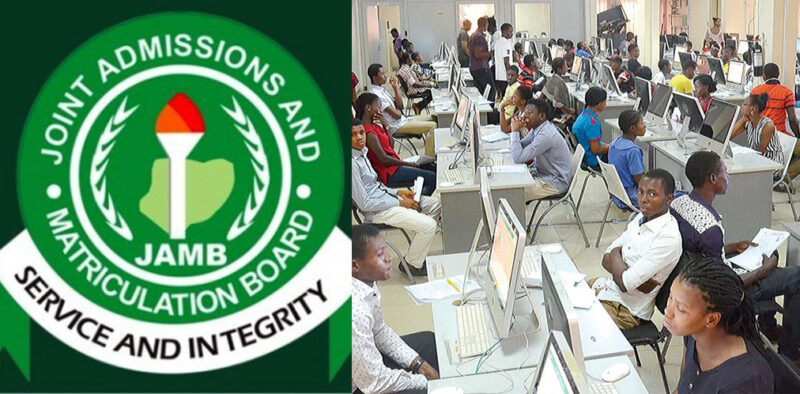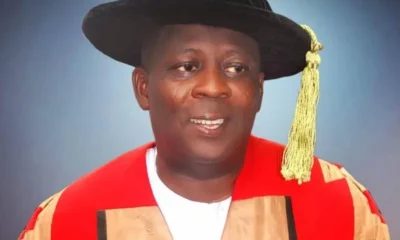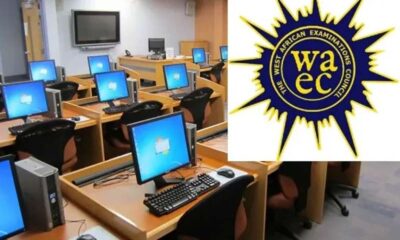Education
How Schools Hike WAEC, NECO Fees, Deny Poor Students Opportunities

Pelumi Abraham was looking gloomy as she stood beside her mistress in a hairdressing salon, handing her attachments while the mistress plaited a client’s hair.
She looked tired and lost, said nothing, nor contributed to the discussions going on in the saloon.
When she was asked if she was fine, she answered in the affirmative, but her mistress cut her short, saying, “the girl is angry because she was not able to complete her senior secondary school, as her parents could not register her for the Senior Secondary School Certificate Examination (SSCE).”
When the customer asked her how much the registration was, Pelumi responded that it was N40,000.
“My parents said there is no money to register me for WAEC and the school insisted that we must register both NECO and WAEC together. So they said I should wait until they are able to raise money, then they will register me with the next set,” she said.
She said: “I was forced to go and learn hairdressing and my greatest regret is that my mates will be ahead of me and I am not sure if my parents will be able to register me next year because then my younger sister will also be due to write senior secondary school leaving examination.”
Pelumi is not the only one who has lost out on completing her studies due to the inability of parents to pay examination fees. Many students are found in this category, while some parents have become debtors just so their wards can write WAEC.
READ ALSO:
- ASUU rejects parents’ N10,000 offer, insists on continuation of strike
- We don’t have enough medical doctors — NMA disagrees with Minister of Health
- Obi-Datti Movement says Omokri using Obi’s name to stay relevant
However, the registration of WAEC and NECO should not have been a big deal if school managements stuck to the original fees of N13,950; an amount that WAEC has been charging for the registration of each candidate since as far back as 2017. It is only recently that the examination body raised the amount to N18,000 due to prevailing inflation in the country.
The Head, Nigeria National Office, WAEC, Mr Patrick Areghan, while visiting its marking centre recently, said there had been a marginal increase of WAEC fees because of the country’s spiralling inflation.
“There has to be that marginal increase to enable us to do better services. The examiners are now happy as we are able to increase their marking fees through this marginal increase. The money actually went for the payments of examiners to enable us to satisfy them so that they can do the job better,’’ he said.
Meanwhile, Daily Trust has gathered that secondary schools charge between N40,000 to N100,000 to register a single candidate for WAEC while others charge the same amount or above for both WAEC and NECO.
A parent, Maryam Julius, said she paid N40,000 in a public school to register her daughter for WAEC.
She said: “It took me a lot before I could raise that amount because this is aside from the school fee and other levies. In fact I was among the last parents to pay because I remember I was told that I would pay an additional fee for late registration.”
A candidate who gave his name as Emmanuel said he paid N100,000 to register for WAEC in a private school.
“My parents insisted I write my exam in a private school because they felt I would do better there and the school insisted on that and this is aside from the school fees.”
For Kenneth Azuh, he paid N240,000 for his two kids in a private school in Gwarimpa, Abuja, to register them for both the examination and JAMB.
“I was very disturbed when I read in the newspaper recently that WAEC registration has just been increased from N13,950 to N18,000. I understood that the actual amount has been low and affordable, which means schools are ripping off us,” he said.
Kenneth blames the authorities for not doing their job properly, saying, “if we are a country that is serious, they should have been able to put measures in place to ensure that schools charge uniform amounts. Even if they had to add administrative charges, it should not be more than N10,000.”
A source close to the WAEC who does not want her name mentioned, said as far back as 2019, a parent complained that the school his children attended in Lagos charged N200,000 to register them for only WAEC.
She said in 2021, a relation of hers wanted to register in a school and she was told that they had closed registration and that she had to pay N40,000 as late entry fee aside N100,000 for registration.
“That was happening when WAEC was yet to commence registration. We were still preparing yet some schools had finished registration and were collecting late entry fees,” she said.
“They are ripping parents off and by so doing, many students could not register because of the hiked fee yet the Ministry of Education is not doing anything about it,” she lamented.
Reacting, the chairman a private School in Abuja, Yussuff Oriyomi, said they charge N70,000 for both WAEC and NECO and that they have no plan to increase it even with the slight increment from WAEC.
He said the N70,000 was for the examinations and associated administrative expenses and that they were actually subsidizing as other schools charged N100, 000 and above.
“For the supervisors, we send school buses to go and pick them up and to return them. Sometimes we will have to book a Bolt cab to pick them up if the school bus is not available. And there are instances where we didn’t go to pick them up, they come late and the students become apprehensive. When they come, we have to give them food as well,” he said.
He said those are some of the extra costs, adding that “the whole process of going to the WAEC office to regularize your registration, uploading the passport photos of students and a whole lot of back and forth that are involved, are part of the administrative expenses.”
“We charge N70,000, some charge N100,000 but it’s for both exams. So if NECO is N18,000, WAEC is N18,000 is that not N36,000 already; and you are paying N70,000. The balance is N34,000 and it’s from that we do data uploads, buy internet. Almost every year they keep changing the software that we use, and we buy the software,” he said.
Oriyomi said the WAEC office is in Gwagwalada and sometimes the exam officer has to go to the office up to 10 times before they finish the registration, adding that their processes were very slow. “Sometimes I’m scared that we may even be spending more than the money we collected from them.”
Reacting, the HNO of WAEC, Areghan said the council only charges N18, 000 for its examinations, whether public or private school.
“We have no hand in extra charges. Nothing more than N18,000 comes to WAEC.
We do not know anything about their providing logistics to supervisors. We pay supervisors for doing the job.”
“Their attempt to justify their illegal charges is laughable. Registration is online. Once you collect your registration materials, you can do your registration anywhere. I do not understand what they mean by “going to WAEC to register is time consuming,” he added.
He noted that it is the duty of the various Ministries of Education to check the excesses of schools in this regard and that parent should complain to their states’ Ministries of Education since schools are under them and not under WAEC.
When contacted, the Director of Press and Public Relations at the Federal Ministry of Education, Bem Ben Goong, said students who are in school registering for WAEC pay exactly what WAEC is charging, possibly with a small administrative fee attached to it, which is understandable.
He however refuted claims that private schools are charging higher amounts even for their own students.
He said, “No, that’s not true. If you have evidence, of anyone that has paid that amount, give it to me; we’re not ghosts. Give us verifiable evidence and we will confront that school.
Education
JAMB Releases 2026 UTME Registration Guidelines, Highlights Common Profile Code, NIN Issues

JAMB Releases 2026 UTME Registration Guidelines, Highlights Common Profile Code, NIN Issues
The Joint Admissions and Matriculation Board (JAMB) has published comprehensive guidelines for the 2026 UTME registration, alongside a list of common challenges candidates may encounter during the process. The update, released on Sunday via the Board’s official X handle, is aimed at helping prospective applicants prepare ahead of the registration window.
According to JAMB, candidates must ensure that all personal information — including National Identification Number (NIN), email address, and A-Level results — is accurate before generating a profile code, as the data cannot be edited afterward. To obtain the profile code, candidates are required to send their 11-digit NIN to 55019 or 66019 in the correct format (e.g., NIN 00000011111).
Once generated, the profile code automatically links to biodata retrieved from the National Identity Management Commission (NIMC). Candidates must then proceed to any JAMB office or accredited CBT centre to complete their registration.
The board advised that E-PINs should only be purchased from approved vendors, including banks, online payment platforms, and authorised merchants at registration centres. Before submitting the final form, candidates are expected to double-check the registration template to ensure all details are correct.
READ ALSO:
- Nigeria Withdraws Fighter Jets as Benin Crushes Failed Coup Attempt
- Dozen Soldiers Held as Benin Govt Thwarts Coup Against President Patrice Talon
- Benin govt says coup attempt foiled as soldiers seize state TV, gunfire rocks Cotonou
JAMB warned that inaccurate or mismatched details may result in delays. Candidates with incorrect data are advised to update their records with NIMC ahead of registration and confirm that the corrections reflect on the portal — especially details such as name, date of birth, gender, and state of origin.
The board emphasised that email addresses and GSM numbers serve as unique identifiers and cannot be changed or shared. These must be functional before registration.
For candidates who encounter biometric issues, JAMB instructed them to report directly to the nearest JAMB office, adding that no CBT centre is permitted to forcibly complete registration without successful biometric capture. Candidates are also advised to ensure that dual screens are used during registration and that their passport photograph and biometrics are captured correctly.
JAMB listed some of the common errors noticed during profile code generation, including:
- Error 55019/66019 — caused by incorrect message format
- Number Already Registered — indicating the SIM is tied to another candidate’s profile
- Unable to Verify NIN — candidates should wait and try again
The 2026 JAMB UTME form will be available for sale from Friday, January 31, 2026, to Saturday, March 8, 2026.
JAMB Releases 2026 UTME Registration Guidelines, Highlights Common Profile Code, NIN Issues
Education
FG Clarifies WAEC Subject Selection, Says Students Free to Choose Across All Fields

FG Clarifies WAEC Subject Selection, Says Students Free to Choose Across All Fields
The Federal Government has issued a clear explanation on subject selection under the revised Senior Secondary School Curriculum as registration for the West African Examinations Council (WAEC) continues nationwide.
In a joint statement released on Saturday, the Minister of Education, Maruf Tunji Alausa, and the Minister of State for Education, Sa’id Suwaiba Ahmad, clarified that there is no restriction or exclusion attached to the choice of any approved subject.
“All subjects remain fully open for students to choose from, provided such choices are properly guided by the school authority, parents, or a certified school counsellor,” the ministers stated.
They explained that science students are free to pick subjects traditionally grouped under the arts or social sciences, while arts and social science students may also select science-based subjects. According to the ministers, the revised curriculum was designed to be flexible, student-centred, and supportive of diverse academic interests and career pathways.
READ ALSO:
- Court Orders Wike to Respond to Tonye Cole’s ₦40bn Defamation Suit
- CAC to Begin Nationwide Crackdown on Unregistered PoS Operators by January 2026
- Studies show menopause can reduce women’s memory, concentration by 40%
The government also clarified that the subject previously known as Information and Communication Technology (ICT) has now been renamed Digital Technology, stressing that the adjustment is only a change in nomenclature. The curriculum content remains intact, and students who offered ICT are fully qualified to register for Digital Technology in both internal and external examinations.
Addressing concerns over trade subjects, the Ministry noted that six have been officially approved.
“A student may register for any of these subjects if the school offers them and the student has been taught the subject. However, there is no obligation to register for a trade subject where a student has not been exposed to any of the six approved options,” the statement added.
Reaffirming its commitment to smooth and accurate examination processes, the Ministry urged parents, school owners, counsellors and examination bodies to rely on verified information and ensure proper guidance to all candidates.
The Federal Government assured that it will continue to promote seamless, well-coordinated WAEC registration across the country.
FG Clarifies WAEC Subject Selection, Says Students Free to Choose Across All Fields
Education
NECO grants full accreditation to schools in Burkina Faso to conduct SSCE, BECE exams

NECO grants full accreditation to schools in Burkina Faso to conduct SSCE, BECE exams
The National Examinations Council (NECO) has expanded its international operations with the accreditation of schools in Burkina Faso to conduct its flagship examinations, the Senior School Certificate Examination (SSCE) and the Basic Education Certificate Examination (BECE).
In a statement released in Abuja on Sunday, the council’s Acting Director of Information and Public Relations, Mr. Azeez Sani, confirmed that NECO granted full approval after a comprehensive assessment of selected institutions in the West African nation.
According to Sani, a NECO accreditation team evaluated the schools’ infrastructure and readiness by inspecting classrooms, laboratories, libraries, computer labs, workshops, examination halls, sports facilities and overall security architecture. The team also reviewed Continuous Assessment (CA) records, staffing levels, and the general learning environment before issuing approval.
“Following a thorough and detailed evaluation, the schools were granted full accreditation to host the SSCE and BECE,” Sani said.
READ ALSO:
- Four Dead, Ten Injured in Mass Shooting at Child’s Birthday Party in California
- White House Shooting: Suspect Once Worked With CIA as US Opens Full Terrorism Probe
- Nigerian army rescues 12 teenage girls abducted by Boko Haram in Borno state
He added that NECO’s expansion into Burkina Faso reflects its growing commitment to providing quality education assessment services across Africa. With this development, the council strengthens its goal of becoming a leading continental examination body serving both Nigerian and foreign students.
Sani further recalled that NECO recently established an examination centre in London, United Kingdom, adding to existing centres in Togo, Benin Republic, Niger Republic, Equatorial Guinea, Côte d’Ivoire, and Saudi Arabia.
Nigeria’s Ambassador to Burkina Faso, Amb. M.D. Galadima, applauded the development, describing it as a major relief for Nigerian families in the country. He noted that parents previously had to take their children to Saki, Oyo State, to register and sit for NECO exams — a process that posed security risks and imposed heavy financial burdens.
“With this accreditation, those risks are eliminated, and families can now save significant costs,” Galadima said, urging Nigerians in Burkina Faso to seize the opportunity by enrolling their children for NECO examinations.
Leader of the accreditation team, Dr. Uche Ezenwanne, said the approval now allows Nigerian students residing in Burkina Faso to write the SSCE and BECE without travelling back home.
NECO grants full accreditation to schools in Burkina Faso to conduct SSCE, BECE exams
-

 Sports2 days ago
Sports2 days ago2026 FIFA World Cup Draw: England Draw Croatia as Brazil Face Morocco in Tournament Opener
-

 News2 days ago
News2 days agoAkpabio sues Natasha for ₦200bn over sexual harassment allegations
-

 metro3 days ago
metro3 days agoTinubu Govt Eliminates More Terrorists Than Previous Administrations — Fani-Kayode
-

 Politics2 days ago
Politics2 days agoOsogbo Youth Group Condemns APC Over Disqualification of Adegoke SAN
-

 metro2 days ago
metro2 days agoNigerian woman sparks outrage for refusing chemotherapy despite ₦30 million donations over religious Beliefs
-

 metro2 days ago
metro2 days agoFour Teenagers Killed in Banki Explosion as Borno Police Probe Deadly IED Blast
-

 Opinion3 days ago
Opinion3 days agoSiyan Oyeweso: Lessons in virtue and vanity
-

 metro1 day ago
metro1 day agoAkpabio denies filing new ₦200bn lawsuit against Natasha















